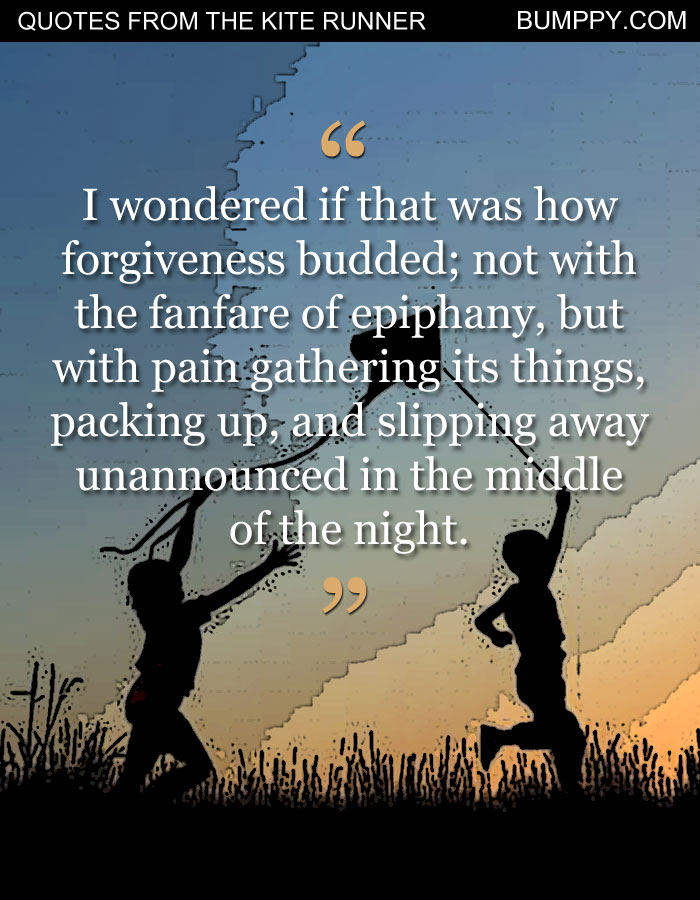


Around the time of the 1960's-70's, mothers were the nurturing and affectionate ones, so Baba may not have acknowledged that because Amir's mother is dead, it's his duty to show his son love and attention.Īs Amir is describing the decoration, he begins to explain the photographs.

Amir seems like a much more emotional character and in need of emotional attention than Baba is willing to give, as he comes across as a tough-love father. This is the moment where we see that although Amir has it 'all' in terms of lifestyle, he would probably give up his material goods just to spend some quality time with his father. This highlights how much Amir craves Baba's approval and furthermore, 'He'd close the door, leave me to wonder why it was always grown ups time with him.' makes us feel sympathy for Amir, as we see how lonely he is. "Go on now," he'd say, "This is grown ups time'. This chapter makes the distance between Baba and Amir obvious, and the fact that Amir desperately craves his fathers attention through quotes like, 'I asked Baba if I could sit with them. Phrases such as 'Intricate mosaic tiles, handpicked by Baba', tells us not only that he is wealthy, but he is a very proud man and has very specific taste. Amir refers to his father as 'my Baba' which shows a very possessive attitude and the reader gains a sense of fear because Amir is clingy and scared to lose him to someone or something.Īmir begins to describe his fathers estate and the house which Baba designed and built. Whilst Hassan is being told off, Amir states 'he never told on me.' which shows how loyal Hassan is to Amir, but Amir's unwillingness to confess makes the reader doubt mutual loyalty between the two boys. Although he disciplines, the reader can tell he is no threat to Amir and won't stop him from being troublesome. ' This tells us about Ali's character and the word 'gentle' suggests Ali is a kind man who is also quite humble. He describes how when they got caught by Ali, Hassan's father, he would get mad 'or as mad as someone as gentle as Ali could ever get. There is a definite social line between them, as Amir seems to be the rich, spoiled boy who is used to getting his way and Hassan is the poor, humble boy who is nice enough to give in but remains aware of the damaged caused by doing so. It also says, 'Hassan never wanted to' showing the reader that out of the two, Hassan was more morally aware than Amir and has more of an understanding of the consequences. This also links to 'if I asked, really asked, he wouldn't deny me.' which tells us that Amir takes advantage of the fact that Hassan can never refuse him which makes the reader feel sorry for Hassan because the friendship is seemingly one-sided. This also tells us that he is the more dominant one in the relationship, while Hassan is the submissive one, wanting to please Amir and possibly gain his respect or make Amir proud of him. It's a very relatable image, allowing the reader to empathise with Amir and highlighting the fact that Amir was a typical young boy.Īmir describes the physical appearance of Hassan, and says he has 'a face like a Chinese doll' which creates an image of flawlessness for the reader, however he goes on to describe Hassan's imperfection, 'the cleft lip where the Chinese doll maker's instrument may have slipped' which is detailed imagery and helps us to understand how Amir thinks and the fact that he's come up with ideas such as this tells us that he doesn't fully understand the cause of this condition, showing the naivety and ignorance of a child.Īmir has quite a manipulative personality, shown through the quote, 'I talked Hassan into firing walnuts'. He talks about how they 'pelted each other with them, (mulberries) giggling, laughing.' This gives the reader a sense of innocence and childish playfulness. It goes through Amir's close and mischievous friendship with Hassan, detailing what they used to do and how Hassan looked in acute description. The chapter starts with, 'When we were children,' which immediately indicates that this part of the story is an analepsis of Amir's life as a young boy.


 0 kommentar(er)
0 kommentar(er)
